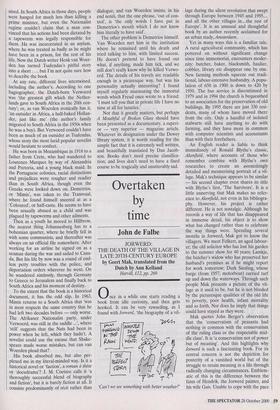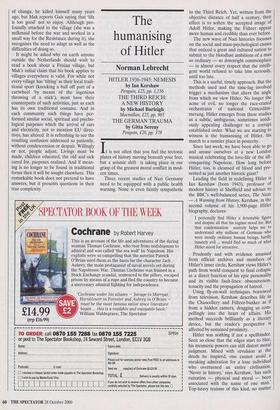Overtaken by time
John de Falbe
JORWERD: THE DEATH OF THE VILLAGE IN LATE 20TH-CENTURY EUROPE by Geert Mak, translated from the Dutch by Ann Kelland Harvill, £12, pp. 269 Once in a while one starts reading a book from idle curiosity, and then gets hooked. It can be very rewarding, as I found with Jorwerd, 'the biography of a vil- `Can't we see something with better weather?' lage during the silent revolution that swept through Europe between 1945 and 1995... and all the other villages in...the rest of Europe'. It is an unusual and thoughtful book by an author recently acclaimed for an urban study, Amsterdam.
Yet in many ways this is a familiar tale. A rural agricultural community, which has pottered on without significant change since time immemorial, encounters moder- nity: butcher, baker, blacksmith, haulier, cobbler, library etc disappear one by one. New farming methods squeeze out tradi- tional, labour-intensive husbandry. A popu- lation of 650 in 1900 is down to 420 by 1950. The bus service is discontinued in 1979 and in 1994 the church is bequeathed to an association for the preservation of old buildings. By 1995 there are just 330 resi- dents, many of whom have moved there from the city. Only a handful of isolated stalwarts still have anything to do with farming, and they have more in common with computer scientists and accountants than with their forefathers.
An English reader is liable to think immediately of Ronald Blythe's classic, Akenfield, where accounts of those who remember combine with Blythe's own researches to create an astonishingly detailed and mesmerising portrait of a vil- lage. Mak's technique appears to be similar — his second chapter even shares its title with Blythe's first, 'The Survivors'. It is a little unnerving that Mak makes no refer- ence to Akenfield, not even in his bibliogra- phy. However, his project is rather different. He is not nostalgic. Although he records a way of life that has disappeared in immense detail, his object is to show what has changed rather than to celebrate the way things were. Spending several months in Jorwerd, Mak got to know the villagers. We meet Folkert, an aged labour- er; the old solicitor who has lost his garden to the summer show for 40 years; Lamkje, the butcher's widow who has preserved her husband's premises as if he might report for work tomorrow; Durk Siesling, whose barge (from 1957, motorboat) carried turf up and down the waterways. Through such people Mak presents a picture of the vil- lage as it used to be, but he is not blinded by the picturesque qualities of the old life to poverty, poor health, infant mortality and so forth. Nor does he imply that things could have stayed as they were.
Mak quotes John Berger's observation that the 'conservatism of peasants had nothing in common with the conservatism of the ruling class or the respectable mid- dle class'. It is 'a conservatism not of power but of meaning'. And this highlights why Jorwerd is such a fascinating book. For its central concern is not the depiction for posterity of a vanished world but of the struggle to retain meaning in a life through radically changing circumstances. Emblem- atic of this is the difference between the fates of Hendrik, the Jorwerd painter, and his wife Gais. Unable to cope with the pace of change, he killed himself many years ago, but Mak reports Gais saying that 'life is too good' not to enjoy. Although pro- foundly attached to the village (she was a milkmaid before the war and worked in a small way for the Resistance during it), she recognises the need to adapt as well as the difficulties of doing so.
It might be asked why on earth anyone outside the Netherlands should wish to read a book about a Frisian village, but Mak's initial claim that his book applies to villages everywhere is valid. For while not every village has 'tilting' as their local tradi- tional sport (knocking a ball off part of a cartwheel 'by means of the ingenious throwing of a stick'), most have their counterparts of such activities, just as each has its own traditional costume. And in each community such things have per- formed similar social, spiritual and psycho- logical purposes which the arrival of cars and electricity, not to mention EU direc- tives, has altered. it is refreshing to see the resulting confusion addressed so patiently, without condescension or despair. Willingly or not, people adjust. Livings must be made, children educated, the old and sick cared for, purposes realised. And if mean- ing is no longer to be found in traditional forms then it will be sought elsewhere. This remarkable book does not pretend to have answers, but it presents questions in their true complexity.



























































































 Previous page
Previous page